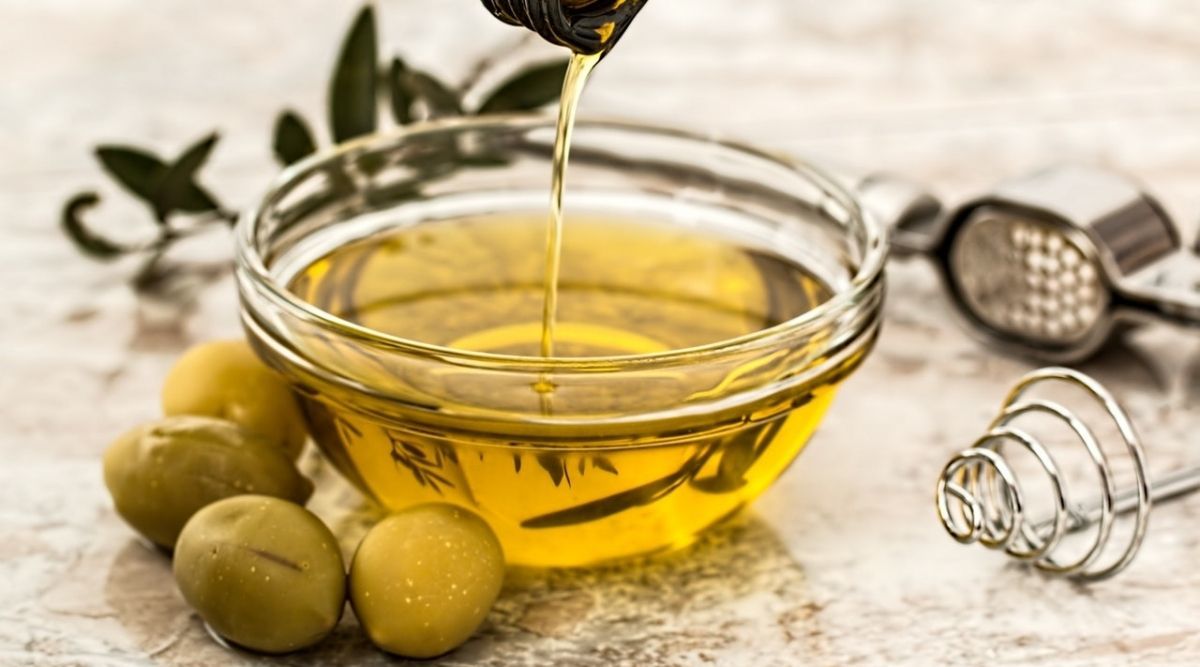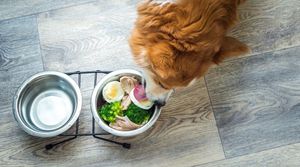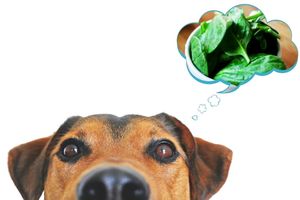Olive oil is found in countless kitchens, and it is a staple cooking ingredient used daily by thousands. Of all the cooking oils you can choose from, it is considered one of the healthiest (and therefore worth the extra expense) and there have been numerous studies conducted that demonstrate its health benefits for humans. But is olive oil good for dogs? Can dogs have olive oil?
The answer is yes, in moderation, dogs can have olive oil, and there are some reasons why it is believed it may even be good for them. It's believed that at least some of the health benefits it can offer to humans are applicable to dogs too, including improved cardiovascular health, a boosted immune system and, the dog specific benefit of improved coat health.
However, before you cover your dog's food in olive oil, there are some things you should know about olive oil for dogs, and some very important considerations to keep in mind, things which we are going to take a closer look at here.
Olive Oil Nutrition and Basic Facts
You probably have a bottle of olive oil in your kitchen cabinet right now. But how much do you really know about the stuff?
Olive oil, as its name obviously states, is primarily made using olives. It is a very old idea, dating back to Ancient times. Olive oil was especially important to the Ancient Romans, which makes sense, as there was - and still is - an abundance of olive trees in the region.
Olives and olive oil were (and still are) a significant element of the ancient Mediterranean diet and culinary process, but the oil extracted from pressed olives was also utilized for a variety of other uses.
It was used by the Romans to cleanse their bodies after exercising by smearing it on, allowing it to absorb dirt and perspiration, and then scraping it off with a strigil, a metal device.
Olive oil was also utilized as a light source, a fragrance ingredient, in religious rites, for massaging, as a multi-purpose lubricant, and even as a medication.
In modern times, humans still make use of olive oil in lots of different ways, but for it to be helpful to dogs its applications are a little more limited, as you'll see in a moment.
In terms of basic nutrition, according to the FDA, one tablespoon of olive oil can be broken down as follows:
- Calories: 119
- Fat: 14g
- Sodium: 0.3mg
- Fiber: 0g
- Sugars: 0g
- Protein: 0g
- Vitamin E: 1.9mg
- Vitamin K: 8.1mcg
- Potassium: 0.1mg
As you might expect (give that olive oil is a popular choice for things like stir frying and deep-frying) the fat content is high, one of the reasons it should be offered to dogs only in moderation, but much of that fat is considered to be the 'good fat' that dieticians often recommend.
Is Olive Oil Good For Dogs To Eat?
So, if dogs can have olive oil in moderation, is it good for dogs, and if so, why?
While not everything that is good for humans to eat is as beneficial for them, experts believe that, despite the fact that there is little canine specific research on the subject, the following very well researched benefits of olive oil for human health apply to them too, as well as a couple of dog specific ones.
Here's a look at some of those benefits:
Better Canine Cardiovascular Health
Olive oil contains vitamin E and phytonutrients that enhance cardiovascular health in addition to heart-healthy monounsaturated fats. Olive oil provides a natural, cost-effective way to protect your dog's heart for years to come, without the need for expensive nutritional supplements.
Improved Joint Health in Dogs
Olive oil's oleic acid and antioxidants have an anti-inflammatory action similar to ibuprofen. Because dogs' bodies are so sensitive to pain drugs, olive oil is a natural option that can help relieve pain and improve mobility in dogs of all ages, but especially older dogs with illnesses like arthritis, rheumatoid arthritis, and hip dysplasia.
Improved Canine Immune Health
Olive oil is high in polyphenols, vitamin E, and chlorophyll since it is a natural, plant-based product produced from the olive fruit. These antioxidants can strengthen your dog's immune system and aid in a battle against a wide range of canine illnesses and health disorders.
The healthier a dog's immune system is, the better, and adding olive oil to their diet is an easy way to boost it.
Improved Digestion and General Digestive Health
Olive oil provides healthy lubrication for your dog's digestive system because it is a natural fat. Whether your dog eats only the food you give it or sneaks a table scrap here and there, including olive oil in their diet in moderation will help keep things running smoothly.
Improved Coat and Skin Health in Dogs
Humans have been using olive oil for centuries as a natural treatment to improve the condition, strength and general health of their hair.
Topical olive oil treatments for dogs are not recommended, as the average dog will naturally just lick off the oil and consume too much of it.
However, anecdotal evidence from both vets and pet parents suggests that adding olive oil to your dog's diet will, over time, improve the general condition and sheen of their coat, and may help moisturize dry skin from within.
How To Feed Olive Oil To Dogs?
Now that we have established that adding olive oil to your dog's diet may be good for their health, you'll want to know about the best way to do that.
The best way, according to most vets and canine nutritionists, is to drizzle it over dry food at mealtimes.
As the benefits of olive oil are cumulative - meaning that the longer and more regularly they are given it the better - this is not only an easy way to add olive oil to your dog's daily diet, but also a great way to remember to do so.
The amount of olive oil you add is perhaps the most important consideration of giving your dog olive oil at all. It is a high calorie food, and while the majority of its fats are considered 'good fats', it is still not a good idea for dogs (or humans) to consume too much of it.
Obesity in dogs can cause a great many health problems, so maintaining a healthy weight throughout their lives is a must.
The accepted standard for canine olive oil consumption according to most vets is a maximum of one teaspoon per 20lbs of body weight at any meal.
This does mean that you'll need to do a little math if yours is a very small, or very large dog, but the extra effort is worth it to help ensure that you are offering olive oil to your dog in the right amount.
Not every dog will like the addition of olive oil to their regular food, though. Some dogs are especially upset if there are any changes to the diet they are used to.
Dogs are not like humans, they don't crave a wide variety of tastes or foods, they are quite content to eat the same thing every day and if changes are made - even small ones like adding a small amount of olive oil to their food - they may refuse to eat it.
In this case, if you are still keen to add olive oil to your dog's diet, you could consider an olive oil enriched treat.
What is the Best Olive Oil for Dogs?
The best olive oil of all is extra virgin olive oil, and that is true for both dogs and humans.
Regular olive oil is a blend of cold-pressed and processed oils, whereas extra-virgin olive oil is produced from only pure, cold-pressed olives. EVOO - as it is more commonly known - is the closest you can get in the modern world to that completely natural olive oil the Ancient Romans enjoyed.
There are benefits of doing things the 'old-fashioned way'. Extra virgin olive oil has a stronger flavor and a darker color, which matters to many cooks, but it also retains more of the good for your dog's health nutrients you are giving it to him for.
EVOO is the most expensive choice you can make though, but given that you should only be offering it to your pooch in very small amounts, a single bottle reserved just for him should last for quite a while!
Signs to Watch Out For If Your Dog Reacts to Olive Oil
Not every dog will do well when given olive oil, as in some pups it can cause digestive upset, leading to unpleasant for everyone diarrhea.
If this is the effect it has on your dog, reduce the frequency or amount of olive oil you offer or remove it from his diet right away.
Can Dogs Have Olives?
Dogs can also have olives, in moderation, under certain circumstances. They should only be offered one or two pitted, ungarnished olives at a time, as the pits can pose a choking hazard, and as they are quite high in fat could lead to weight gain.
The sodium level in olives is also high, and dogs do not need a lot of extra salt.
How Can Olive Oil Help My Dog's Skin and Coat?
As we mentioned earlier, it is believed that the 'good' fats in olive oil can help improve a dog's coat and skin condition if it is offered to them on a regular basis.
Do not expect overnight miracles though - the positive effect will take at least a few weeks to become noticeable - and do not use olive oil as a topical treatment.
Dogs and Constipation: How Much Olive Oil?
Olive oil may help a dog who is mildly constipated, but it should not be given to them in large amounts in an attempt to relieve the condition.
At most, the standard advice of one teaspoon per 20lbs of body weight should still be adhered to and if this does help you should consult your vet for other solutions and advice.
In Dogs, What is Olive Oil Better For and What is Coconut Oil Better For?
Some humans are swapping olive oil for coconut oil in their diets. And you might be wondering if you can do the same for your dog. Most vets believe that coconut oil in very small amounts is OK for dogs, but many are still very skeptical about the many health claims that are being made about it.
If you do decide to try coconut oil for your dog, it is claimed it offers benefits like improved skin health and faster wound healing if applied topically, as well as a shinier coat.
If you feed it to your dog, you should do so in very small quantities, as it is high in both calories and fat.




